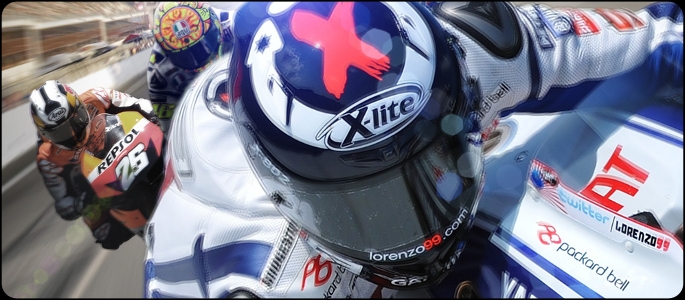When it comes to racing games, this generation of consoles is chock full of them. However, when it comes to two-wheeled circuit racing ala superbikes, your choices are decidedly more limited. Enter Capcom‘s MotoGP 10/11. Does this game fit the bill, or does it slam into the retaining wall? Find out in our review.
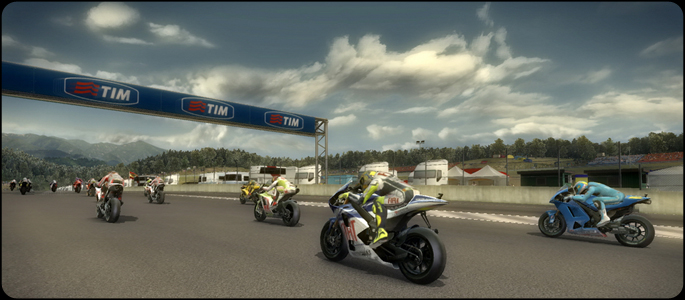
If you’ve ever watched superbike racing, you know that it is an intense affair, with riders leaning with their entire bodies to steer around curves, their helmets mere inches from the hard asphalt below them and their knees literally rubbing over the road. These drivers also have to contend with other competitors only a few fractions of a second ahead, behind or otherwise in close vicinity to themselves. Mistakes are made thanks to just the slightest twist of a wrist in the wrong direction, and crashes can get pretty ugly in short time. But a lot of this seems to be missing in MotoGP 10/11. The tight racing lines and even tighter sector/lap times are there, but while riding, your character just seems to be a camera moving about the racetrack. Sure, you can have the bike’s panel in front of you in the cockpit view, but the intensity of the race is mostly absent at all but the highest of speeds. All you hear is the engine of your bike as well as any around you – your helmet somehow miraculously drowns out seemingly all of the wind that is rushing by you. Also, although motion blur is usually overdone in a game like this, it is nonexistent until you are practically at the threshold of your bike’s speed limits. Up until that point you are simply going through the motions of the track. Summed up, 40 MPH feels the same as 80 or even 100 MPH.
Speaking of the general look and feel of MotoGP 10/11, there are some highlights but mostly drawbacks. Audio wise, beyond the rev of the engine, generic background music, narrator and noises of the crowds in the grandstands, there isn’t much to be had here. The game is presented in 5.1 surround, which is decent enough to discern if someone is coming up behind you and to what side; however, echos can really play a trick on you, and you will be looking behind you quite often to see that no one is threatening you. One thing we did notice in our playthrough is that when there are multiple riders in the area, particularly at the start of a race, the audio for your own bike will simply drop out. This is definitely a problem, especially if you race with a manual transmission. So it sounds like that area of MotoGP 10/11 could have used a bit more testing.
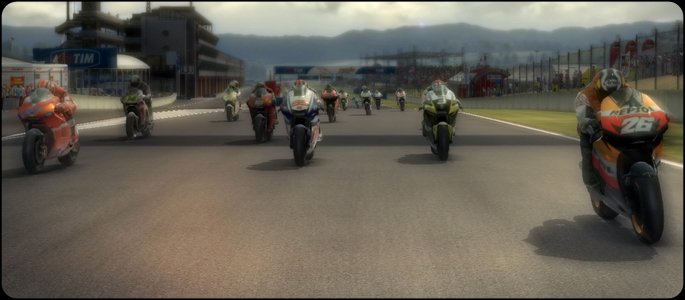
Graphically, the game is nothing to write home about. Tracks that you may know very well thanks to the likes of Gran Turismo, such as Laguna Seca, are presented accurately, but do not look particularly impressive. If you end up in the gravel the effects used are not really believable, but at least they are in to begin with. Character and bike models are serviceable, but ultimately remind us of a PlayStation 2 title given an HD conversion – it looks clear, but there is not as much definition as there would be in a higher-resolution title.
Okay, so the game isn’t AAA caliber when talking about its presentation, understandable given that this is budget-priced ($39.99). But it’s a racing game, right? So how does it control? Unfortunately, rather flatly. What we mean by this is that, as mentioned earlier, you never really feel like you are a professional superbike rider. Your viewpoint stays mostly pointed forward, and when you turn it is the bike that does most of the moving – your vantage point only sways slightly. Perhaps this is because it is too jarring of an experience to have your view changing so drastically, but it seems as if the developers just couldn’t get the experience of being in a superbike quite right. This is all in cockpit mode – in third-person view, as with any racing game, the experience is far less involving, so of course the camera is expected to move far less when turning. Beyond the mishaps in cockpit mode, controlling speed seems pretty tough. Hitting your front brake seems to take too long to have any real effect, and holding both front and rear brakes helps, but still feels a bit light.
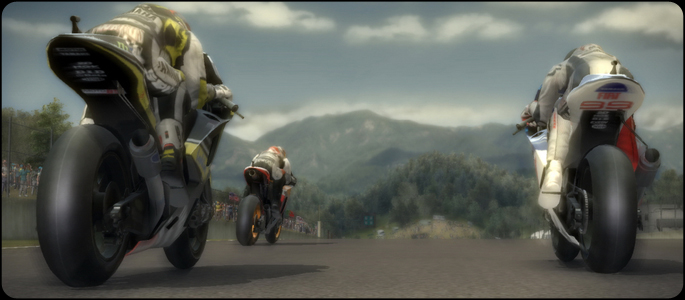
Now, MotoGP 10/11‘s career mode is most assuredly one of the game’s shining features. You start out as a rookie driver, and are put in a test race to determine how much money you start the new season out with. Using that money, you choose a motorcycle and off you go. As you progress through the season, you can hire talent such as engineers and public relations managers, who you can use to research better parts for your bikes and a better public-facing image for yourself. There are also wildcard events every now and then, which can earn you a nice stack of cash just before a big race. Having to pay for team members and later deciding to fire them, in the process losing all research they have contributed thus far is a nice balancing act, and adds to the overall appeal of this game mode. You are also given sponsorship offers by various companies, who typically offer money in return for satisfying a certain race condition and slapping a sticker on your ride, though they may occasionally offer up gear or even new bikes.
Splitscreen co-op is present in the career mode, something that is becoming rarer in this generation of gaming. It can serve to help out your main career, and if you have a friend who also likes this sport then it is highly recommended. There is also competitive splitscreen for those up to challenge a buddy. Online multiplayer is here as well, with support of up to 20 players in a game at a time. In our time with the game, we did not see anyone online and were always forced to host a game that no one joined. This is likely due to the sport being more popular in Europe than the States, but as it stands right now you will get the most out of this game online if you use the leaderboards, which can be used to download ghosts of the best lines for you to try to beat.
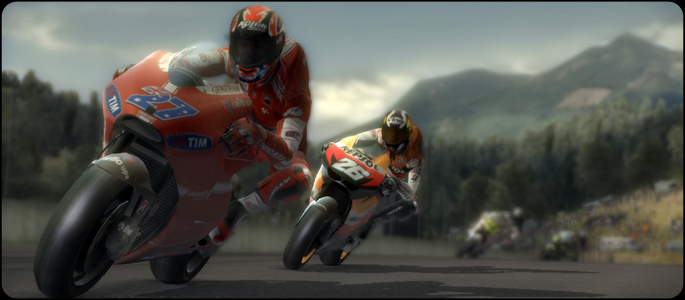
MotoGP 10/11 has the official seal of the MotoGP association, meaning it is an officially licensed title. So it has all the official teams, riders and tracks from last year’s season, and will also receive updates as events occur in the real-life 2011 season. Kudos to Capcom there, since it is always nice when a sports title can reflect the current season as it unfolds and put it in game form.
So, to wrap things up here – if you are not a fan of two-wheeled racing, then this is definitely not the game for you. But if you enjoy the thrill of this particular chase, and can overlook the game’s average visuals, occasionally glitchy audio, and even the rather flat control scheme in cockpit mode, then you will likely enjoy MotoGP 10/11, more so as the real season gets going and the game is updated to reflect events as they unfold. The price point is a cool $20 less than most titles, which is less of a sting on your wallet. A number of hiccups mar the experience, but the career mode shows genuine potential to evolve into something great.
PlayStation LifeStyle’s Final Score
– Graphics and audio average at best, glitchy at worst. – Controls need work, online games hard to find. |
 |
